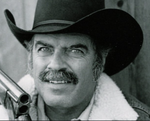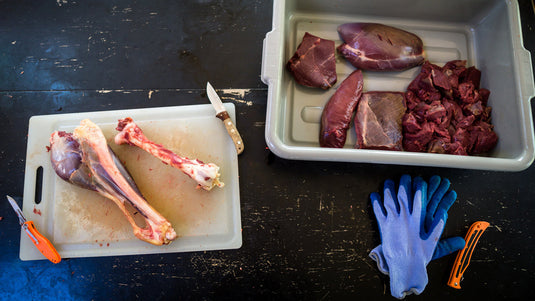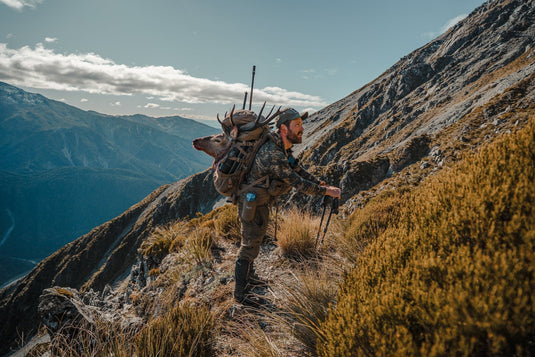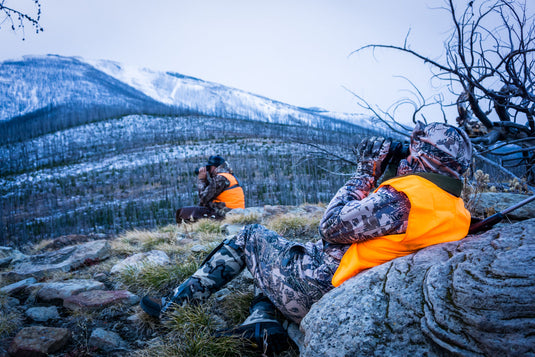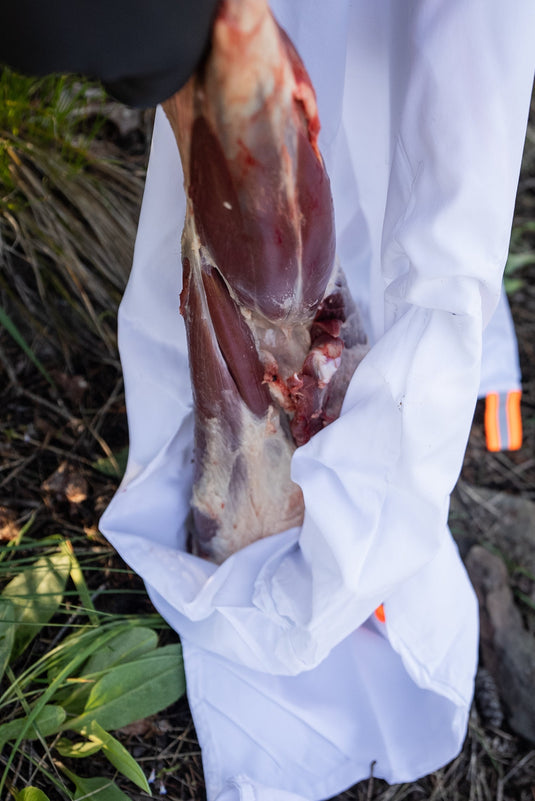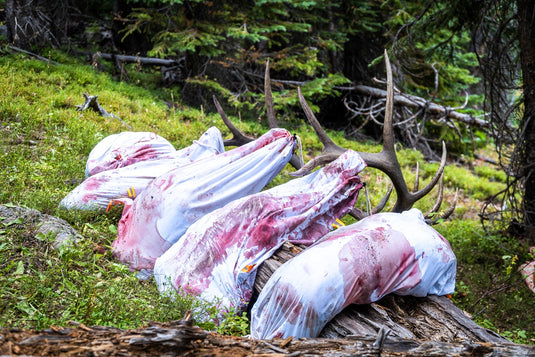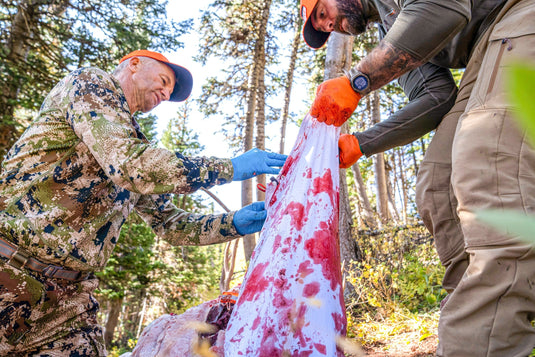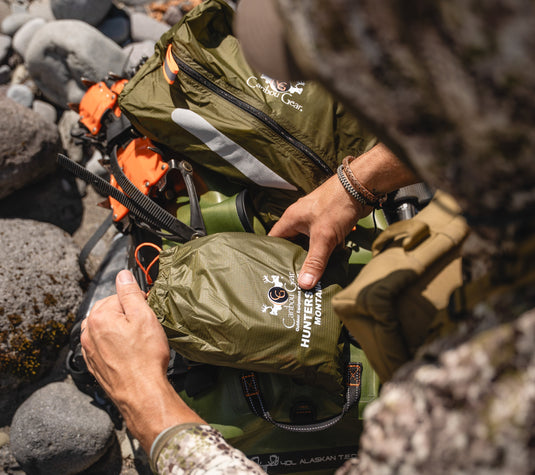Having been a seminar speaker and exhibitor at many outdoor Expo shows I can honestly say the most common question I’ve been asked is about outfitters. Hunters who intend to hire an outfitter are naturally concerned that the outfitter they choose is honest and reputable. Unfortunately, there are some who are not. There are bad apples in every profession, whether it’s political, religious, law enforcement, medical — you name it.
Let’s look at what an outfitter is. In this case we’ll consider big game outfitters, especially those who hunt elk. Of course, there are outfitters who will take you hunting for upland game, waterfowl, and other species. Some will take you fishing here and abroad.
The big game outfitter may accommodate you in many ways, from the most basic to the most elaborate. You may stay in a motel, an RV unit, a cabin, tent, or a lodge that has hot tubs, fancy bars, fine cuisine and other luxury items.

The most unique hunting “camp” I’ve ever been on was a 65 foot boat along the rugged and remote Kodiak island coast. We hunted by taking small motorized rafts to shore and returning in the afternoon when the hunt was over. If you’re considering a wilderness hunt by horseback you’ll probably be sleeping in a wall tent and doing a lot of hiking in rough country and hunting on a horse extensively.
For many serious hunters, accommodations are not terribly important as long as the outfitter gets them into prime game country and offers shooting opportunities. I know avid hunters who would sleep on rocks to get a shot at an elk.
The outfitter himself wears many hats. He must be a savvy outdoorsman, he must be intimately familiar with the country he’s hunting, and he must understand the behavior habits and patterns of the quarry. He must also be able to get along with people, be a counselor, have integrity, have a knowledge of first aid, and be honest. He must also be able to improvise when necessary and fix things in camp that break down.
Outfitters may hunt on ranches they own or lease federal lands managed by the U.S. Forest Service, the Bureau of Land Management, wildlife refuges and state lands.
Before you book with an outfitter, be sure to communicate with him about your expectations. Are you looking for an elk for your freezer, a representative bull, or a trophy?

If it’s a trophy, how big? Of course, a trophy is in the eye of the beholder, so you need to be specific.
Be sure to inquire about details. Tell the outfitter if you have any medical issues, and what you prefer not to do, such as ride horseback in the dark, hike a great deal in difficult terrain, and other matters that might concern you, especially if you’re headed into the remote backcountry.
It’s important to know how many hunters are going out with a guide. Typically a one on one hunt is more expensive than two hunters per guide. Of course, if there are two hunters there needs to be a way to determine who gets first shot. That can be a serious dilemma.
Always ask for references, but don’t rely on the names the outfitter gives you since he might offer the names of only those hunters who were successful. Ask the references for the names of other people who were in camp. Hunters often share business cards and contact information.
A shady outfitter might not tell you the details of the hunt. If you were made aware of them, you’d certainly never book with him. For example, I know of an outfitter who sent his guide off with three or four hunters. The guide would provide each hunter with a crude map and turn each hunter loose with a sack lunch and a bottle of water. He’d tell each of them to hunt independently and where to meet at a road after shooting light was over. To me, this is fraudulent and deceitful, especially since the outfitter charged each hunter for a full hunt.
Then there are outfitters who are amazingly honest. I knew one who was approached by a very obese man at an outdoor expo show. The man said he’d heard about the outfitters‘ reputation and wanted to book a hunt. He got out his checkbook and was ready to write a check for the deposit.

The outfitter looked at him and told him that he didn’t have a horse that could carry him. He also said there was an option to walk, but he didn’t think the man could travel in difficult terrain. The man was incensed and walked off. The outfitter could have taken his money and made some effort to get him an elk by driving around the mountains in a pickup, but he knew it would be futile.
Hunters commonly ask an outfitter about his hunter success. That’s an unfair question. For example, I hunted with five others on an elk hunt. Two of us scored, one man missed two elk, another hunter failed to see an elk the guide was pointing out, and the last man was afraid to ride his horse in the dark so he left camp well after daylight. He never saw an elk. Hunter success was 40% but in reality four hunters had opportunities. Hunter success could have been 80%. This indicates that the question of hunter success can be very misleading. If you asked the outfitter about shooting opportunities you’d have a clearer picture of his operation.
Be sure to ask the outfitter about any extra or hidden fees. You don’t want any surprises before, during or after the hunt.
You can find outfitters from several sources. Nowadays many advertise on social media. Many still place ads in magazines. Attending a hunt expo will allow you to visit with outfitters on a personal level. Be aware, however, that even though an outfitter seems to have integrity and appears to be honest you should still check his references and do some research on him before booking.
One thing is for sure. No fair chase outfitter can guarantee that you’ll have a successful hunt. While the outcome of the hunt may depend on him and your guide, you need to do your part as well. Always keep that in mind.
